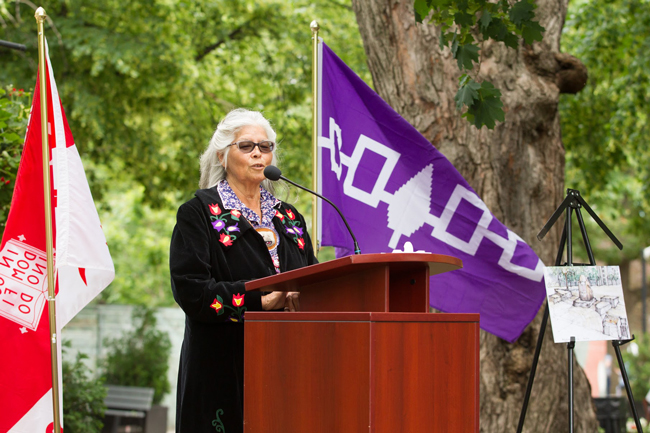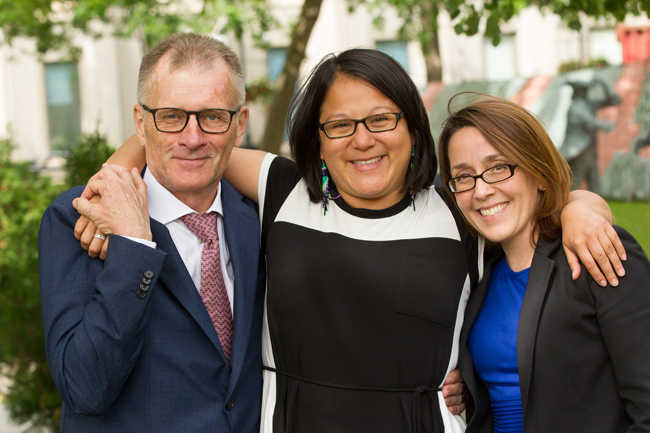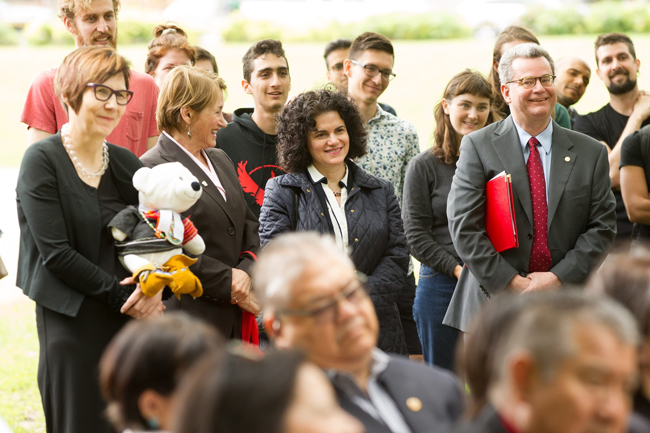
Provost’s Task Force Report on Indigenous Studies and Indigenous Education unveiled on National Aboriginal Day
By McGill Reporter Staff
Amelia McGregor, elder of the Kahnawá:ke Mohawk Nation, pronounced the Mohawk prayer OHÉN:TON KariwatéKMWA, the Words Said Before All Else, to open the launch of the Report of the Provost’s Task Force Report on Indigenous Studies and Indigenous Education earlier today. The purple and white flag of the Iroquois Confederacy, as well as the flags of McGill, Quebec and Canada framed the event. It was a fitting opening since Mohawk was once common parlance where McGill now stands.
A smiling Paige Isaac wished the 200 people gathered on lower campus “Happy Indigenous People’s Day” to rousing applause. Isaac is one of three Task Force co-chairs and Coordinator of First Peoples’ House. The launch was held under the trees at the Hochelaga Rock, a symbol of the long-standing presence of First Nations people, which stands facing the statue of James McGill near the Roddick gates. Along with Isaac, the Task Force was co-chaired by Professor Hudson Meadwell, Chair of the Department of Political Science, and Professor Angela Campbell, Associate Provost, Equity and Academic Policies.

Addressing the crowd, Principal Suzanne Fortier said “Not so long ago we were here on this site to recognize the importance of moving the Hochelaga Rock to a prime location on campus. Today we are here to celebrate this new report. The Provost has dedicated serious resources to implementing the calls to action. I hope to see you again at this spot soon.”
Provost Christopher Manfredi told the crowd that more than one million dollars will go to put into place the recommendations of the Task Force. “We have committed to tripling the number of Indigenous students at McGill in the next five years, and to ensuring their success, working closely with Indigenous communities. A new Special Advisor, Indigenous Initiatives, will be set up under the auspices of the Office of the Provost and Vice-Principal (Academic), and an Assistant VP will be tasked with ensuring Indigeneity is reflected and embedded in the University.”
The Task Force Report identifies more than 50 Calls to Action across a wide range of academic and non-academic aspects of McGill life. The Provost is committed to ensuring swift and substantive response to the recommendations of the Task Force, with new and renewed support for our Indigenous students, faculty and staff and for Indigenous scholarship, as well as meaningful exchange and engagement with Indigenous communities in Quebec and across Canada.

The Task Force is a direct result of the 2015 Report of The Truth and Reconciliation Commission of Canada (TRC), headed by Justice Murray Sinclair, Canada’s first aboriginal justice and the commission’s chairman. The TRC was a commission like no other in Canada. The Commission spent six years travelling to all parts of Canada to hear from the Indigenous people who had been taken from their families as children, often forcibly, and placed for much of their childhoods in residential schools, something which the report says amounted to ‘cultural genocide.’
“There has been tremendous damage done to our cultures and people. Restitution cannot come fast enough for us,” said Ellen Gabriel, a Mohawk activist and artist from Kanehsatà:ke Nation – Turtle Clan, and the former head of the First People’s House. “We want McGill to be a place that welcomes Indigenous students and where they see themselves reflected. We don’t need the status quo. We need to create change together. We need to rewrite the future while thinking of our ancestors in this place.”
Also present at the event were Ghislain Picard, Chief of the Assembly of First Nations of Quebec and Labrador; Joseph Tokwiro Norton, Grand Chief of the Mohawk Council of Kahnawá:ke; Michael Loft, former professional associate of the McGill School of Social Work; and the Hon. Geoffrey Kelley, MNA for Jacques-Cartier and Minister Responsible for Native Affairs, among many special guests.
The Hochelaga Rock is a five-ton granite monument installed in 1920 in honour of the meeting of Jacques Cartier with the Iroquoian people who inhabited the area. The stone was moved from the lower field to a more prominent place close to the statue of founder James McGill in the summer of 2016. Shortly after that, in the fall of 2016, the Provost’s Task Force was publicly launched at the new site of the Hochelaga Rock.

